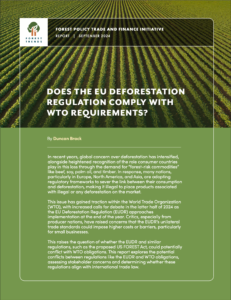Does the EU Deforestation Regulation Comply with WTO requirements?
By Duncan Brack View PublicationIn recent years, global concern over deforestation has intensified, alongside heightened recognition of the role consumer countries play in this loss through the demand for “forest-risk commodities” like beef, soy, palm oil, and timber. In response, many nations, particularly in Europe, North America, and Asia, are adopting regulatory frameworks to sever the link between their consumption and deforestation, making it illegal to place products associated with illegal or any deforestation on the market.
This issue has gained traction within the World Trade Organization (WTO), with increased calls for debate in the latter half of 2024 as the EU Deforestation Regulation (EUDR) approaches implementation at the end of the year. Critics, especially from producer nations, have raised concerns that the EUDR’s unilateral trade standards could impose higher costs or barriers, particularly for small businesses.
This raises the question of whether the EUDR and similar regulations, such as the proposed US FOREST Act, could potentially conflict with WTO obligations. This report explores the potential conflicts between regulations like the EUDR and WTO obligations, assessing stakeholder concerns and determining whether these regulations align with international trade law.

